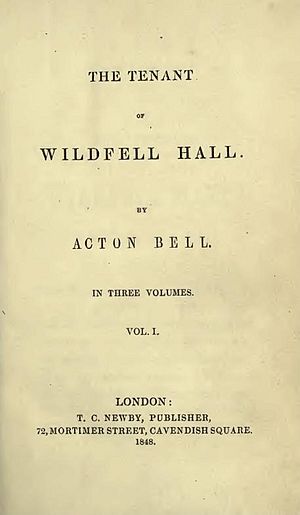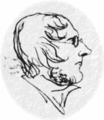The Tenant of Wildfell Hall facts for kids

Title-page of the first edition, 1848
|
|
| Author | Anne Brontë (as "Acton Bell") |
|---|---|
| Country | United Kingdom |
| Language | English |
| Genre | Novel |
| Publisher | Thomas Cautley Newby |
|
Publication date
|
June 1848 |
| Media type | Print (Hardcover) |
| Pages | 3 vols., 492, ?, ? |
| ISBN | 978-0-19-920755-8 |
The Tenant of Wildfell Hall is a famous book written by Anne Brontë. She used a pen name, Acton Bell, when it was published in 1848. The story is told through letters from a character named Gilbert Markham. He writes about how he met his wife, Helen Graham. It's a classic story from England.
Contents
The Story of Wildfell Hall
Gilbert Markham writes about a mysterious young woman named Helen Graham. She arrives at an old house called Wildfell Hall with her small son and a servant. Helen does not want to talk about her past life with her new neighbours. Because of this, many people in the village think she must have done something wrong.
Only a few people believe Helen is a good person. These include Gilbert, his sister Rose, and their friend Mary Millward.
Gilbert starts to fall in love with Helen. But then, he begins to hear rumours and starts to doubt her. To help him understand, Helen gives Gilbert her secret diary.
Helen's Diary
In her diary, Helen writes about her life with her husband, Arthur Huntingdon. He had many bad habits and made poor choices. He started teaching their young son, also named Arthur, some very bad habits and words.
Helen decided she had to protect her son from his father's influence. She bravely chose to run away from him. After facing many difficulties, she secretly came to live at Wildfell Hall.
A New Beginning
Helen eventually leaves Wildfell Hall when she learns her husband is very ill. She goes to care for him until he passes away.
After some time, Helen and Gilbert get married. They live a happy life together and have at least two children.
Other Books by Anne Brontë
- Poems by Currer, Ellis and Acton Bell (1846)
- Agnes Grey (1847)
Images for kids
-
Self-portrait – one form of artist's self-identification
-
The story of Helen Graham, according to Samantha Ellis, may have inspired Emily Mary Osborn's painting Nameless and Friendless (1857), which depicts a widow attempting to make a living as an artist.
-
Charles Kingsley believed that English society "owes thanks, not sneers" to Anne Brontë
See also
 In Spanish: La inquilina de Wildfell Hall para niños
In Spanish: La inquilina de Wildfell Hall para niños












